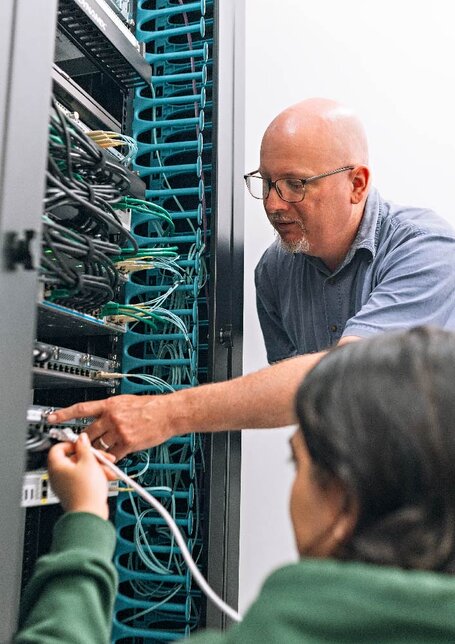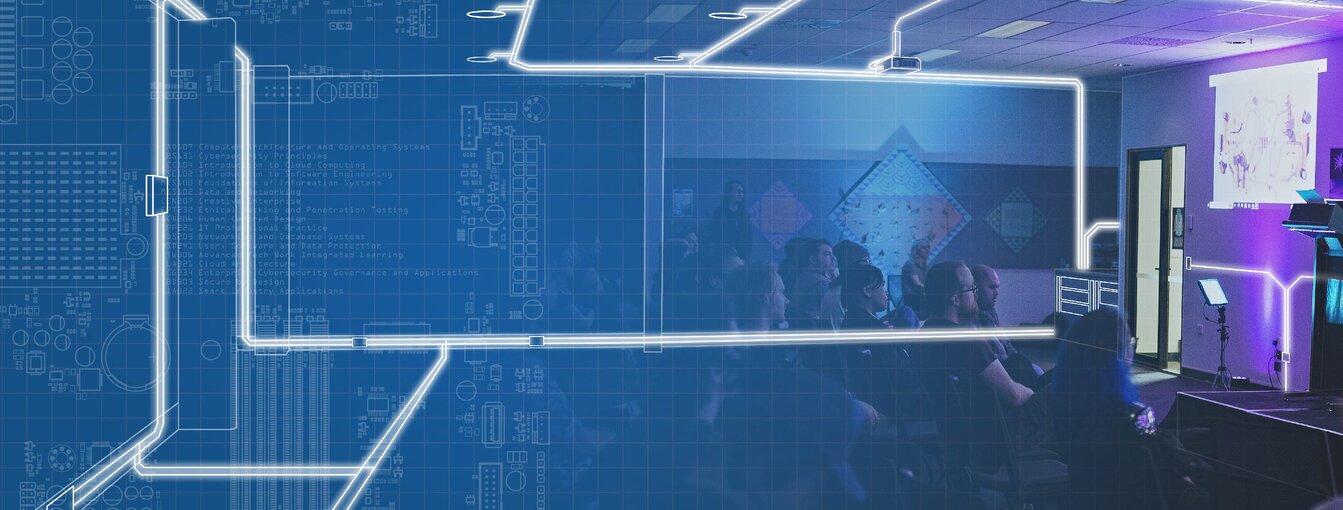What is the Bachelor of Information Technology?
Technology with a creative edge
Develop key information technology (IT) skills while cultivating a mindset of creativity and innovation, with MDS’s Bachelor of Information Technology.
This IT course will equip you with a range of technical skills for rapidly growing digital industries, complemented with the knowledge of human centric computing, design thinking and media technologies. The Bachelor of IT at MDS isn’t just about coding and algorithms; it’s a dynamic fusion of disciplines that equips you with problem-solving skills for a range of industries.
Our Bachelor of Information Technology focuses on high-demand areas in Aotearoa and globally, including, but not limited to:
- Cybersecurity
- Software Engineering
- Cloud Computing
- Human-Centred Design
- Ethical Hacking
When you graduate, you'll have knowledge across a wide range of IT applications, along with hands-on experience with industry-standard tools. This will ensure you're job ready and able to pursue a rewarding career in current and future Information Technology markets, where software engineering, smart computing, global connectivity, and human-centric technologies are thriving.

A dynamic fusion of disciplines
Gain a wealth of technical knowledge whilst cultivating the MDS mindset that embraces innovation and creativity at its core.
Course Outline
Structure & Components
Design your own IT job pathway based on your interests and career direction, with our personalised learning experience. Along with the core components, you’ll take one elective each semester that enhances and supports your area of IT interest.
For example, if you want to strengthen your knowledge and skills in AI, you’ll be able to select electives such as Concepts of AI in Year 1, followed by Applications of AI in Year 2, and Machine Learning Principles or Deep Learning in Year 3. See a full list of available options in the 'Electives' tab.
Soft skills, such as communication, organisation, teamwork, creativity, problem-solving and analytical abilities are embedded throughout the programme, with Mātauranga Māori incorporated where applicable.
Year 1 will cover the six core components listed below, along with two electives from Level 5.
See the ‘Electives’ tab for the Level 5 options you can choose from in Year 1.
| Component Name | Credits | Toggle |
|---|---|---|
|
Computer Architecture and Operating Systems
|
15
|
|
|
This component provides you with knowledge and skills to understand the design, organisation and operation of a modern computer system from both a hardware and software perspective.
Level 5
CAO107
PC4774
|
||
|
Cybersecurity Principles
|
15
|
|
|
This component provides you with fundamental knowledge and skills of cybersecurity principles and solutions to identify and mitigate the impact of security threats on contemporary business environments.
Level 5
CBS131
PC4774
|
||
|
Introduction to Cloud Computing
|
15
|
|
|
In this component, you'll learn the fundamental elements of Cloud Computing. Identify the building blocks of Cloud Computing including essential characteristics, different service models and how these models differ from each other. You'll also develop an understanding of resource pooling and virtualisation in the Cloud. Learn about various deployment models in cloud computing and how these deployment models differ from traditional IT deployment models.
Level 5
ICC104
PC4133
|
||
|
Introduction to Software Engineering
|
15
|
|
|
This component introduces the information and skills needed to begin working in
software engineering. This component will cover the concepts of object-oriented programming with a particular focus on learning to use the C++ programming language. An understanding of C++ will form the basis of the necessary skills needed for developing professional and complex software packages. Level 5
ISE102
PC4133
|
||
|
Data and Networking
|
15
|
|
|
This component provides you with the opportunity to develop your fundamental knowledge and skills related to data and networking systems.
Level 5
MIS102
PC4774
|
||
|
Foundations of Information Systems
|
15
|
|
|
This component provides you with the knowledge and skills to identify business or organisational information systems requirements and recommend appropriate IT solutions.
Level 5
MIS100
PC4774
|
||
90 Core Credits + two 15 Credit Electives = Total of 120 Credits in Year 1
Year 2 will cover the six core components listed below, along with two electives from Level 5 and/or 6.
See the ‘Electives’ tab for Level 5 and 6 options you can choose from in Year 2.
| Component Name | Credits | Toggle |
|---|---|---|
|
Creative Enterprise
|
15
|
|
|
This component introduces you to the fundamentals of creative enterprise, including entrepreneurship and the concept of an entrepreneurial mindset in the technology sector. It stimulates new ways of thinking about enterprising behaviour in a multi-disciplinary manner. You'll learn to identify opportunities, creatively solve problems, network, communicate persuasively and work effectively in a team. In addition, this component will empower you to propose new ventures that focus on social change for good.
Level 6
CEN207
PC4133
|
||
|
Ethical Hacking and Penetration Testing
|
15
|
|
|
This component provides you with the knowledge and skills to apply ethical hacking and penetration testing practices for vulnerability testing in order to propose security recommendations.
Level 6
EPT232
PC4774
|
||
|
Human Centred Design
|
15
|
|
|
This component helps you explore several important fields of general inquiry about significant intellectual issues related to human beings, so you can view everyday problems and formulate solutions in new ways. Human Centred Design gives you an appreciation of the factors that influence human behaviour and interactions, so that you can apply specialised skills to help solve problems affecting diverse societies.
Level 6
HCD206
PC4133
|
||
|
IT Professional Practice
|
15
|
|
|
This course provides you with the knowledge and skills to develop as a professional within an IT environment.
Level 6
IPP221
PC4774
|
||
|
Networking & Database Systems
|
15
|
|
|
This component introduces you to core concepts of Networking and Database Systems. You'll learn the fundamentals of Database Management Systems and network topology, including network architecture. You'll be introduced to relational database models and learn the fundamentals of the structured query language (SQL). You'll then apply these concepts by completing multiple software engineering projects.
Level 6
NDS203
PC4133
|
||
|
User, Software and Data Protection
|
15
|
|
|
This course develops your knowledge and skills in the area of secure software solutions incorporating advanced software security, data protection, and incident management - according to secure software governance standards.
Level 6
USD241
PC4774
|
||
90 Core Credits + two 15 Credit Electives = Total of 120 Credits in Year 2
Year 3 will cover the five core components listed below, along with one elective from Level 5, 6 or 7.
See the ‘Electives’ tab for the Level 5, 6 or 7 options you can choose from in Year 3.
| Component Name | Credits | Toggle |
|---|---|---|
|
Advanced Tech - Work Integrated Learning
|
45
|
|
|
This component is designed to provide you with professional experience in an area related to your specialisation. The aim of providing industry-specific opportunities is to enable you to develop work-ready skills that will enhance your job prospects and build your career for the future. Much of the benefit of work integrated learning comes from observation, practising under supervision and reflection. Work Integrated Learning is an excellent way to broaden your learning environment while you're studying. It allows you to see first-hand how what you're learning in your degree translates into practice, as well as how ‘real world’ practice relates to what you're learning.
There are two work integrated learning options available: Option 1: Internship/volunteer Work within a technology company as an intern, or volunteer at technology non-profit. This encourages you to build long-term relationships with the tech industry and provides an opportunity for you to work with and learn from people who may end up becoming colleagues, bosses or mentors. It also provides a context in which to enhance your communication skills and work collaboratively in a professional arena. You'll undertake a series of industry-led tasks that are relevant to your field of study in order to understand the key concepts of working in and managing a professional technology team, with emphasis placed on the operation of the environment. Option 2: Industry Live Brief Respond to criteria set within the context of an Industry Live Project. An understanding of research methodologies appropriate to professional practice and the documentation of personal creative investigation will be explored. You'll also further investigate and examine entrepreneurial and commercial opportunities through collaborative work practice. The component is delivered from a cross-specialisation perspective and draws on both specific and common software engineering practices. You'll be required to work both independently and as part of a collaborative team in order to conduct research, analyse and define project parameters. Level 7
ATW306
PC4133
|
||
|
Cloud Architecture
|
15
|
|
|
This component provides you with the knowledge and skills to design, construct and test cloud architecture with explicit consideration of relevant governance, cybersecurity and IT service requirements.
Level 7
CLA321
PC4774
|
||
|
Enterprise Cybersecurity Governance and Applications
|
15
|
|
|
This component provides you with the knowledge and skills to plan, design, secure and manage enterprise computing systems against cybersecurity threats.
Level 7
ECG334
PC4774
|
||
|
Secure by Design
|
15
|
|
|
This component equips you with the fundamentals of Secure by Design, enabling an understanding of its underlying key principles and the core pillars of Information Security: Confidentiality, Integrity, and Availability. The component is structured around the main Secure Development Lifecycle (SDLC) models. It also discusses Security by Design principles, appropriate SDLC model selection, application of secure development techniques, vulnerabilities and techniques to tackle them, secure design and development best practices, introduction to encryption, and introduction to the classification of security flaws and application security.
Level 7
SBD303
PC4133
|
||
|
Smart Industry Applications
|
15
|
|
|
This course provides you with the knowledge and skills to propose and develop inventive smart industry 4.0 applications with consideration to end-user social impacts and ethical practices.
Level 7
SIA322
PC4774
|
||
105 Core Credits + one 15 Credit Elective = Total of 120 Credits in Year 3
Below are the list of available elective components at each level.
Level 5:
| Component Name | Credits | Toggle |
|---|---|---|
|
Algorithms & Data Structures
|
15
|
|
|
You'll learn the fundamental data structures and algorithms needed to solve common software engineering problems. In this component you'll work on a number of projects and solve common problems by designing, developing, implementing, testing, and enhancing a collection of data structures and algorithms.
Level 5
ADS103
PC4133
|
||
|
Concepts in AI
|
15
|
|
|
The goal of this component is to familiarise you with the basic concepts of artificial intelligence and the problems AI is used to solve. The course content is organised around the three main areas of AI: Search, Logic, and Learning.
Level 5
CAI104
PC4133
|
||
|
Maths 1
|
15
|
|
|
This component introduces you to foundational mathematical concepts necessary for specialisation components in your degree. The main topics covered are – Linear Algebra, Discrete Maths, and Geometry. The delivery consists of theoretical elements, a demonstration, and then you'll be able to put these skills into practice. You'll collaborate and share mathematical problem-solving approaches during frequent in-class discussions and will be expected to provide these solutions for class reviews.
Level 5
MAT101
PC4133
|
||
|
Micro-services Architecture
|
15
|
|
|
In this component, you'll learn the fundamentals and core concepts of Service Oriented Architecture and characteristics of microservices. You'll compare microservice architecture with monolithic style, emphasising why the former is better for continuous delivery. You'll also deal with operational complexities that are created while managing, monitoring, logging and updating microservices, and learn about the tools used to successfully manage, deploy and monitor applications based on microservice.
Level 5
MSA106
PC4133
|
||
|
Probabilities and Statistics
|
15
|
|
|
This component provides an elementary introduction to probability and statistics with applications. In probability, you'll learn about probability and distribution theory by defining probability and then studying its key properties. The component will also introduce concepts of random variables, outcomes of random experiments and data analysis techniques using the statistical computing package R or SPSS. In statistics, you'll study data and uncertainty. You'll learn how to use statistics in the design of effective experiments and in determining the type of data collected.
Level 5
PST107
PC4133
|
||
Level 6:
| Component Name | Credits | Toggle |
|---|---|---|
|
Applications of Artificial Intelligence
|
15
|
|
|
This component builds on the skills and knowledge acquired from Concepts of Artificial Intelligence (AI). The component begins by exploring different classifications of AI (e.g., Expert Systems, Planning and Robotics, Natural Language Processing (NLP) and Speech Recognition, Machine Learning, and Computer Vision) and their current applications. You'll be presented with case studies focusing on the overview of the development of NLP, Speech Recognition and Computer Vision (most commonly used applications of AI and Machine Learning). This component also covers the AI for Good movement and how AI is being used to address economic and socially relevant problems.
Level 6
AAI202
PC4133
|
||
|
Classification and Regression
|
15
|
|
|
This component introduces you to the statistical models for regression and classification necessary for more specialised components in this degree. The main topics covered are Classification Algorithms and Regression Algorithms; the practical use of both methods, how to evaluate the proposed models and how to choose between the different available methods. Theoretical lectures about the main concepts to be studied are followed by demonstrations of the different applications. Then you'll be asked to apply the learned concepts on different classification and regression problems.
Level 6
CLR204
PC4133
|
||
|
Software Engineering Principles and Practices
|
15
|
|
|
This component focuses on the skills required to produce a game both on time and on budget. You'll be introduced to project management, design patterns and produce game management approaches for simple projects using a software engineering framework. You'll be presented with a range of software project management methodologies and contemporary methods, as well as effective/ineffective planning and effective/ineffective management examples (using case studies).
You'll learn to separate project management considerations from the wider context of game development. You'll be given game design and technical design documents to review in terms of project management, task allocations and stakeholders’ roles and responsibilities. Level 6
GD2S01
PC3992
|
||
|
Introduction to Data Science
|
15
|
|
|
This component introduces you to this rapidly growing field and equips you with some of its basic principles and tools as well as its general mindset. You'll learn concepts, techniques and tools you need to deal with various facets of data science practice, including data collection and integration, exploratory data analysis, predictive modeling, descriptive modeling, data product creation, evaluation, and effective communication. The focus in the treatment of these topics will be on breadth, rather than depth, and emphasis will be placed on integration and synthesis of concepts and their application to solving problems.
Level 6
IDS201
PC4133
|
||
|
Project Based Learning Studio: Technology
|
15
|
|
|
This component provides you with an opportunity to work collaboratively on a series of projects, enhancing skills such as project management, time management, prioritisation and a gamut of interpersonal skills within a team of people across multiple specialisations. Additionally, you'll be challenged to find creative solutions for product development and small-scale rapid prototypes. You'll engage in peer learning through agile development and processes. This learning experience will enhance your self-development and enable continuous learning.
Level 6
PBT205
PC4133
|
||
Level 7:
| Component Name | Credits | Toggle |
|---|---|---|
|
Deep Learning
|
15
|
|
|
This component builds on the skills and knowledge students acquired from Machine Learning Principles and focuses on deep learning. It introduces you to foundational topics on neural networks, its applications to sequence modelling, computer vision, generative models and reinforcement learning. A focus will be given on learning how to model and train neural networks to implement a variety of computer vision applications. You'll be presented with practical examples of how to develop applications using deep learning. Knowledge in programming and understanding of machine learning concepts is required in this component.
Level 7
DLE305
PC4133
|
||
|
Data Mining & Visualisation
|
15
|
|
|
This component teaches you data mining techniques for both structured and unstructured data. You'll be able to analyse moderate-to-large sized datasets, data preparation, handling missing data, modelling, prediction and classification. You'll also be able to communicate complex information in results of data analytics through effective visualisation techniques.
Level 7
DMV302
PC4133
|
||
|
Software Engineering Capstone Project
|
30
|
|
|
The Software Engineering Capstone Project enables you to investigate specific areas of interest towards the application of software engineering principles, practices and expertise in your major production.
You'll be encouraged to study the interaction between software engineering and its associated disciplines (e.g. computer science, management, mathematics, and systems engineering). This knowledge can then be applied to enhance and integrate with information from scholarly sources, forming academic research and creating the path towards higher educational opportunities. Level 7
GD3S01BSE
PC3992
|
||
|
Machine Learning Principles
|
15
|
|
|
This component covers machine learning concepts and techniques such as supervised and unsupervised machine learning techniques; learning theory, reinforcement learning and model performance improvement. It also discusses risks and limitations of machine learning. The component will also introduce you to the applications of machine learning, such as robotics, data mining, computer vision, bioinformatics, and natural language processing.
This component requires you to have programming skills and knowledge in probability, statistics, regression, and classification. Level 7
MLP301
PC4133
|
||
Part-time Study
Our part-time study options are designed with flexibility in mind, allowing you to balance your education with other life commitments. With part-time study at MDS, you can tailor your learning experience to fit your unique schedule and needs. We’re here to support you in achieving your academic goals while accommodating your busy lifestyle.
Careers & Industry
The Bachelor of Information Technology will prepare you for a career in the Information Technology industry by providing a broad range of knowledge and skills encompassing smart technologies, enterprise computing, governance and management of software systems, networks and cybersecurity, cloud computing and intelligent systems.
Chief Technology Officer (CTO)
Systems Administrator
IT Support Specialist
Course Requirements
| General Admission | NCEA Level 3, CIE or IB University Entrance or Level 4 or higher Qualification from related discipline (not required for students 20+) Full details including discretionary entrance based on Level 2 Excellence Endorsement can be found here. |
| International Students | To apply for this degree, you'll need a minimum qualification of NCEA University Entrance or CIE (University of Cambridge International Examination) or IB (International Baccalaureate) or equivalent overseas secondary school qualification or have completed one year of tertiary study from recognised institution. Please Note: Entry requirement may vary based on your country of citizenship. Please refer to our International Page for entry requirements at mediadesignschool.com/international-students. If you country is not on the list, please email international@mediadesignschool.com for further information. All international students must be 18 years of age when the programme commences (on- campus or online). International applicants can start their application before they turn 18 years of age. |
| General Admission |
NCEA Level 3, CIE or IB University Entrance or Level 4 or higher Qualification from related discipline (not required for students 20+) Full details including discretionary entrance based on Level 2 Excellence Endorsement can be found here. |
| International Students |
| To apply for this degree, you'll need a minimum qualification of NCEA University Entrance or CIE (University of Cambridge International Examination) or IB (International Baccalaureate) or equivalent overseas secondary school qualification or have completed one year of tertiary study from recognised institution. Please Note: Entry requirement may vary based on your country of citizenship. Please refer to our International Page for entry requirements at mediadesignschool.com/international-students. If you country is not on the list, please email international@mediadesignschool.com for further information. All international students must be 18 years of age when the programme commences (on- campus or online). International applicants can start their application before they turn 18 years of age. |
As an international student, you'll need to prove you have sufficient English language skills in order to complete this course. We'll be looking for Academic IELTS overall score of 6.0 (minimum) with no band less than 5.5, successful completion of LANGUAGECERT Academic test, or equivalent test result.
Students from Denmark, Finland, Germany, the Netherlands, Norway, and Sweden will be able to meet language requirements through their academic transcripts- no need to provide IELTS or official certificates.
We accept a range of internationally recognised English Language proficiency test. Find out more on the NZQA website or download the NZQA list HERE.
Before you begin your study with us, you will need to have a suitable device that has the functionality to run the programmes required for your course.
Click the link below to find course-specific requirements and recommendations, along with links to more information about hardware specifications. We have prepared these recommendations to help our students equip for flexible, blended learning.



